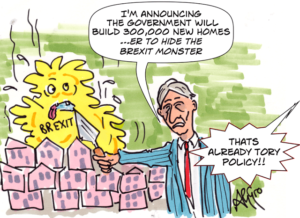23 November 2017
A lens on the week

UK
BUDGET: Yesterday’s budget speech was delivered against disappointing figures from the independent Office of Budget Responsibility. Forecast growth has been marked down, from 2% to 1.5% for the current year with a further decline in the four years after that. The drop is driven by expected low productivity, not surprising perhaps as investment is held back by Brexit uncertainties. A loosening of borrowing policy means that the deficit will fall more slowly than previously expected, although it is predicted that this year will see the ratio of debt to GDP peak at 86.5%. After that the proportion of debt to GDP should begin to fall.
The main direct tax thresholds rose in line with inflation, as expected. From next April the tax free allowance will be £11,850 and the 40% rate will begin at £46,350. There is to be no reduction in the threshold for VAT but changes to the indirect tax system include an extra 28p on a packet of twenty cigarettes. Duties on alcohol, short flights and economy long haul are frozen, a decrease in real terms, and fuel duty is to be frozen too but with an increased burden on bad diesels. The duty on premium class long haul flights and private aircraft will go up.
The Government’s flagship proposals relate to housing. There first time buyers spending less than £300,000 will not pay stamp duty land tax. If they are in the £300,000 – £500,000 bracket they will pay no tax on the first £300,000 but then a catch up rate of 5% on the next £200,000. There are other measures to attack the shortage of housing. £44 billion is earmarked for a building programme which is expected to deliver 300,000 homes a year by the middle of the next decade. That is about 100,000 more than was previously expected. Councils will be able to charge more Council Tax on empty properties and will be able to acquire building land which is being retained by developers for commercial reasons. Still, it has to be remembered that it will still take time to get proposals through the planning system.
Dollops of money are being thrown at a number of problem areas. £3 billion is being put aside to prepare for the various forms of Brexit. £1.5 billion is being used to ease the introduction of universal credits, inter alia reducing the waiting time for the first payment from six weeks to five. There is an extra £6.3 million of funding for the National Health Service, and although no provision has been made for increased payments to nurses, the government is to use new money to fund any award made to them. Additional money spent on education will have a nerdish bias with £40 million on training more maths teachers and £30 million on digital courses employing AI.
BREXIT: It is never boring on the Brexit frontier where new issues are always ready to take the limelight. This time it is the jurisdiction of the European Court of Justice in relation to the rights of EU citizens who continue to live in the UK. The official line here is that that will end after a transitional period of two years but immigration minister Brandon Lewis says that the point is yet to be negotiated. More encouragingly he hopes that applications for settled status to begin next year will only take a couple of weeks each. Well, we’ll see.
As Germany does its best to match the political chaos in the US and Britain, a bizarre debate has begun over whether we should exploit the weakness of Angela Merkel. Some senior Tories are in favour. A German minister Christian Schmidt has warned that it would be a dangerous thing to do. One thing however remains a mystery. How on earth would we do it?

International
EAST AFRICA: So President Mugabe has resigned before he could be impeached. But is this an entirely Good Thing? Zanu (PF) has secured change at the top by keeping things in the party; will they now carry on just as before? Would impeachment proceedings have opened the door to opposition elements and an opportunity for real change? Meanwhile, the Supreme Court in Kenya has dismissed the legal challenges against last month’s questionable re-run of last August’s elections. Are we in the curious position of cheering a military coup and booing a legal judgement? See Kenya and Zimbabwe for more comment.
GERMANY: The political paralysis following September’s inconclusive elections deepened with the collapse of talks which should have produced a coalition government. The prospect of another election looms, and with it the possibility of the defeat and exit of Angela Merkel. As some Germans are anxiously anticipating an uncertain post-Merkel future, others may be looking back over the Merkel-dominated past and asking themselves what exactly does she stand for and what does she represent? What actions and decisions has she taken to make a difference in these troubled times? Has she been anything more than just a comforting, vaguely centrist figure who has managed stability and continuity?
NORTH KOREA: The USA put North Korea back on the list of countries it considers to be a state sponsor of terrorism (it was taken off the list in 2008 as part of a deal which was supposed to halt its nuclear ambitions). The USA also imposed new sanctions, aimed at shipping and Chinese trade with Pyongyang. China sent a special envoy to North Korea; the head of China’s international department visited Pyongyang to report on the recent Communist Party Congress in Beijing, but it is thought that the visit was also prompted by President Trump’s request for more action from China regarding the crisis. Satellite photos indicate that North Korea is building a new nuclear-armed ballistic missile submarine, according to US analysts. South Korean intelligence officials reported that Kim Jong-un has purged the head of the army’s General Political Bureau and his deputy, in what appears to be a power struggle between the party and the army.

Financial
DON’T CALL US…: “The board has concluded that the next stage of [the company’s] development is best delivered under alternative leadership”. Er, whoops. Those elegant words do not even try to conceal a world of troubles. The centre of the troubled world being in this particular case Alabama, and the company the British engineering giant and FTSE 100 constituent GKN. The leadership needing an alternative is that of incoming, but now outgoing, chief executive designate, Kevin Cummings. Mr Cummings, who masterminded the acquisition of Fokker Aircraft last year, had long been marked as chief executive designate to replace Nigel Stein who retires at the end of this year. Mr Cumming’s present job, or we should say, immediate past job, was running GKN’s aerospace division (no connection with Fokker) which a couple of months ago announced a minor problem in its North American division in Alabama. It turns out not to be so minor – there is an undisclosed shortage of working capital in that division and it looks as though something between £80 and £130m has gone astray. The company and its auditors are now carrying out a detailed investigation and Mr Cummings has left with immediate effect. The issue is said to relate to stock and debtor valuations in Alabama, which has been working on a long running American defence hardware contract, a programme now in its final stages. The difficulties leave GKN with no chief executive and no immediate prospect of appointing one (a non-executive director, Anne Stevens, will take over for the time being), and with a Finance Director new to the job – Jos Sclater, in-house counsel who is just in the process of taking over from Adam Walker who is also leaving. Sometimes even the most careful plans just do not turn out as expected.
GO WEST, FISH HEAD: “A company from over here, that’s doing rather well over there”. Remember that catch phrase, used in a series of adverts illustrated by a Union Jack and Stars and Stripes knotted together? It was Hanson Trust, run by James Hanson and Gordon White, who diversified away from UK risk by setting up in the USA. Gordon White set up in the Helmsley Hotel in New York where legend has it that his deal making activities got off to such an active start that the hotel switchboard jammed within the first week. But since then British companies have tended to flounder in the US; not just GKN; HSBC and Barclays both tried hard but had to retreat, Wolsley tried to export its brand of buildings services but ended in a mess fixed only by acquiring American management and leaving them to it, Pizza Express had a complete disaster. Now another brave company is putting its best fish forward – Yo Sushi, the Japanese style restaurant chain famous for bringing food to the diner by conveyor belt, has already tried once but fell out with its franchisee; a second attempt with a new partner is apparently going much better and Yo has four restaurants open and trading well. Now it has taken a much bigger step, by acquiring the Canadian operator Bento Sushi, a similar but much bigger business with around six hundred outlets in both Canada and the US (Yo has ninety four, seventy seven in the UK). Bento also has an expanding wholesale business which supplies sushi to shops and caterers. The deal is being backed by a UK venture capital fund, Mayfair Capital Partners, that owns Yo. This is likely to represent a step towards a realisation of its investment by creating a business big enough and visible enough to seek a public listing, either in London or in the US; or as Hanson and White did – in both.
If you enjoyed this post please share it using the buttons above.
Please click here if you would like a weekly email on publication of the ShawSheet

